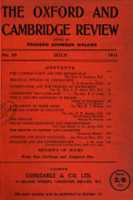Birthday Reviews: E.M. Forster’s “The Machine Stops”

Most days in 2018, I’ll be selecting an author whose birthday is celebrated on that date and reviewing a speculative fiction story written by that author. To kick off the series, let’s wish a happy 139th birthday to an author not known specifically for his science fiction: E.M. Forster.
E.M. (Edward Morgan) Forster was born on January 1, 1879 and died on June 7, 1970. Not generally thought of as a science fiction author, he was active writing before science fiction was codified as a genre and some of his writing can be classified as falling under the genre’s rubric. Best known for novels that explore the class differences in British society such as A Room with a View, Howards End, and A Passage to India, Forster also wrote the future satire “The Machine Stops” published in November, 1909 in the Oxford and Cambridge Review. Forster included the story in his short story collection The Eternal Moment and Other Stories in 1928, and James Gunn included it in the second volume of his history of science fiction, The Road to Science Fiction: From Wells to Heinlein. The story has been adapted for television, stage, radio, and graphic novel. The story also inspired a concept album of the same name for the band Hawkwind. In 2012, “The Machine Stops” was inducted into the Libertarian Futurist Society Hall of Fame.
From the very beginning, “The Machine Stops” has a very contemporary feel. A woman is sitting in an almost empty room which could have been designed by Apple. Everything is white with light and music coming from invisible sources, but both of which respond to her voice commands. Her son calls her on a tablet in order to convince her to come visit him, while she doesn’t see the point in leaving her home since she has everything she needs, either virtually or in reality, within easy reach. The lecture series described could easily be a series of TED Talks.
Vashti is perfectly happy in her self-contained world, not needing to interact with anybody or experience anything directly, and that is the way most people feel. She is jostled from her bliss by her son, Kuno, who insists that she visit him, not virtually, as a normal person would, but physically. She eventually makes the arduous journey via air-ship, forcing herself to breath unfiltered air, interact with rude stewards who don’t have the decency to avoid speaking to her, and eventually visits her son. He tells her that he expects to be made homeless, evicted from the self-contained world and forced to live on the surface. Even more unsettling to Vashti is that Kuno doesn’t necessarily consider this punishment the end of the world.